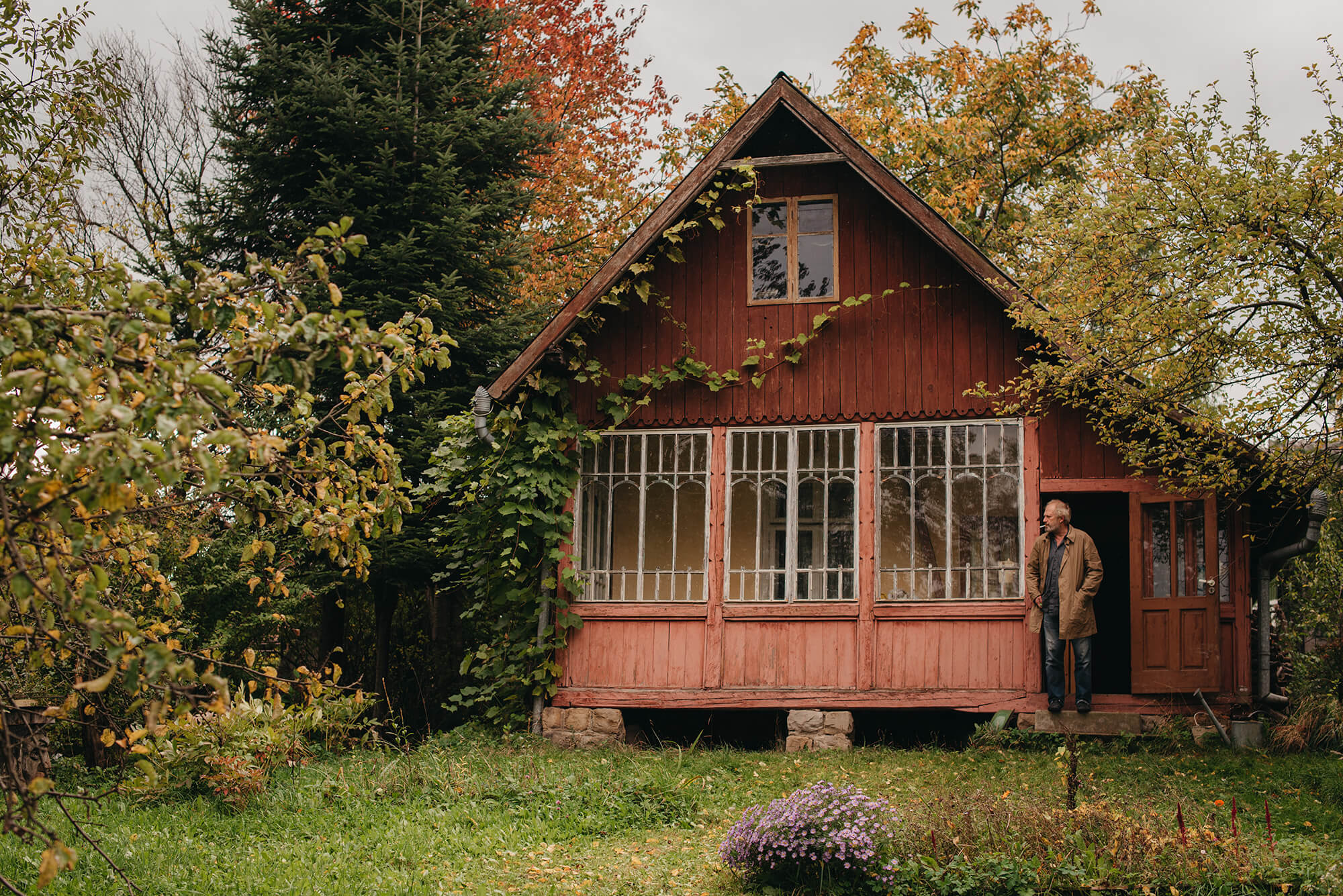
Some of the Things not Mentioned in His Diary
Mykhailo Flys built his house in 1934 in one of the corners of the wildly sprawling, multangular, and equiangular town of Deliatyn.
Deliatyn was one of the oldest towns in the Hutsul region. It had long been famous for its saltwater spas and brine. It also became one of the most important centers for tailoring keptars, Hutsul traditional sheepskin vests. There is even such a notion, a Deliatyn-type keptar. The town had a town hall, a coat of arms, and all the town privileges. Real mountains are just beginning here, but they are already real, although not very high. The Carpathian valley of the Prut ends here. Then the Prut turns to the east, straightening out to Kolomyia.
The origin of the Flyses is somewhat obscure. The fact that this word means those who raft timber can equally point to Tyroleans, Italians, and Silesians. In any case, Mykhailo’s father—Yurko Flys—was already fully Ukrainianized. Moreover, he must have gotten some education because, at the beginning of the 20th century, he was working at the railroad, and in the only picture of him, he is dressed in some kind of uniform. He must have traveled around the region quite a bit, for he married a purebred Hutsul girl who was all the way from Usteriky.
Yurko was an activist of a radical party. One of the issues of the Dilo newspaper reported that a big party gathering was held in Deliatyn on Yurko Flys’s land. It was attended, among others, by deputy Lahodynskyi from Deliatyn and Trylovskyi and Stefanyk.
Yurko was a member and activist of all the Ukrainian organizations and had a tame hawk. His house stood on a hill above a ravine they called a scarp there. In the 1890s, a section of the Stanisławów-Voronenko railway was laid on that scarp. Thus, life on a remote hill far from town and the main road turned into life by the railroad. In the end, the house burned down from a spark that flew out of a locomotive smokestack onto the wooden roof.
Mykhailo was born in 1902. He was too young to join World War I. Instead, the war came to their backyard. At the edge of the Gorgany virgin forest, which began three hundred meters from the house, there were elaborate systems of trench lines and dugouts built to cover the only road through these wild mountains along the Lyubizhnya river. In 1916, Yurko Flys died a natural death in his house, having managed to assign his children the lots into which he had divided all of his lands.
Such is the backstory—as far as memory goes.
It was only in 1934 that Mykhailo got ripe for building his own house. Before that, he studied, played in the theater, danced Cossack dances, was a member of the fire-sports society, and went with his brother to work in Holland.
The town flourished. Spas replaced its large saltworks. There were dozens of villas and recreation centers offering healing water and baths similar to those of Marienbad. There were the beaches of the Prut and good places for skiing and sledding.
Mykhailo built a house that can be called modern or urban. Although small, it was no longer a traditional Hutsul house. It had a veranda and a porch that looked like balconies. Mykhailo did almost everything himself. His brother, who already had his own house nearby—closer to the street, but farther from the edge of the mountain with panoramic views of three sides of the world,—was a carpenter and helped with the windows, doors, and furniture. The house was wooden. It was made of sawn beams, lined diagonally with thin strips of wood, covered with a layer of clay mixed with straw and horse manure, and then plastered and whitewashed. It had a wood shingle roof. There was a well twenty meters from the porch.
Since Deliatyn was a town, there were several thousand Jews and Poles living there. Mykhailo Flys fell in love with Karolina. They started living together.
Then began the times that no one in Deliatyn talks about, even these days. Everything is too confusing. Too many of those who remained were involved in various things brought about by the new turn of history. Too much harm was done. In any case, numerous Jews were the first ones to vanish. Then Sydir Kovpak’s guerrillas attacked the town. In the meantime, Ukrainian self-defense units were formed. Both Germans and Ukrainians had claims against Poles.
Reportedly, one of the reasons why forty-year-old Mykhailo Flys volunteered for the “Galicia” Division of the SS was precisely to protect his wife from possible repressions.
Flys managed to keep everything that happened next so secret that the fact of his involvement in the division never appeared in any investigation files.
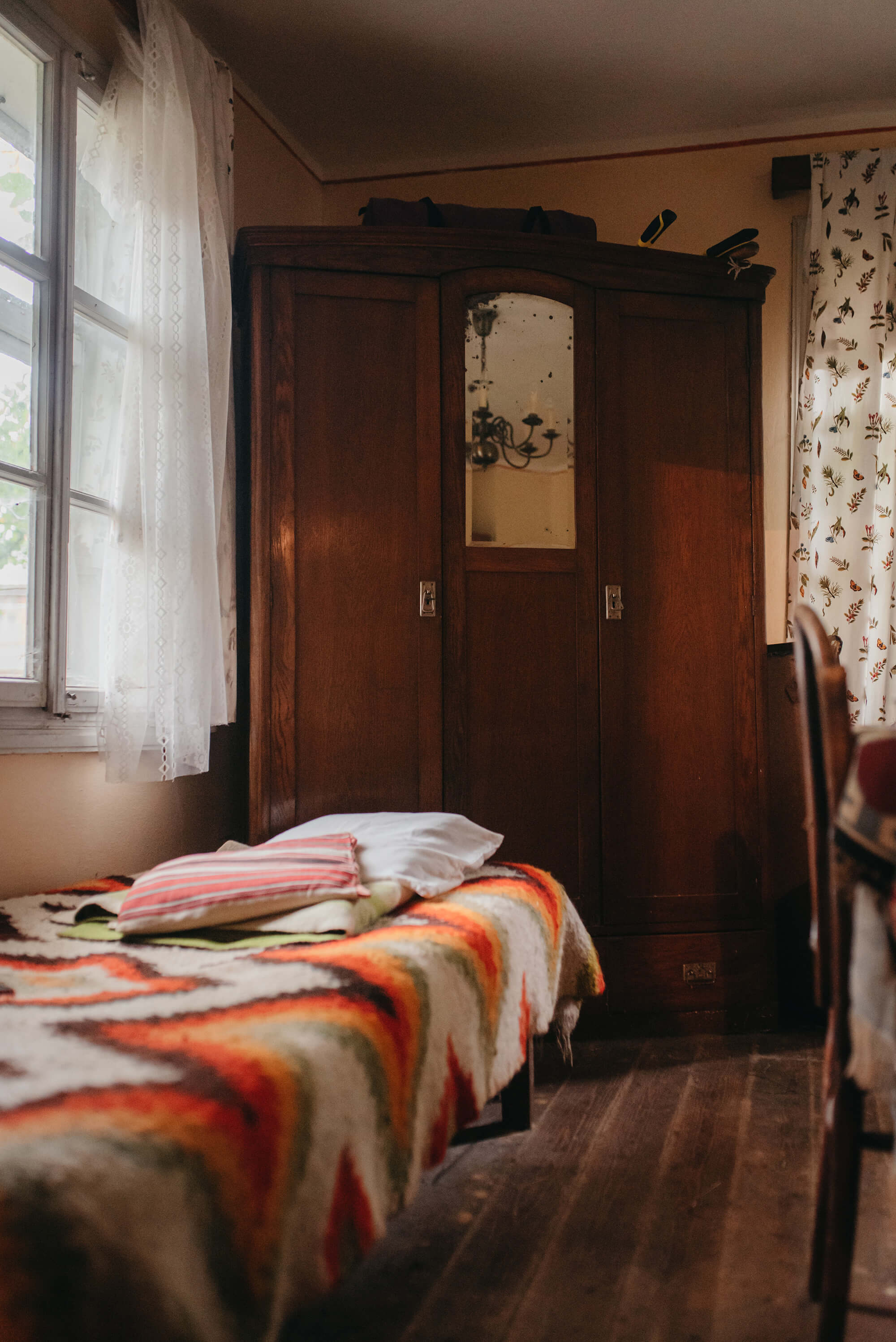
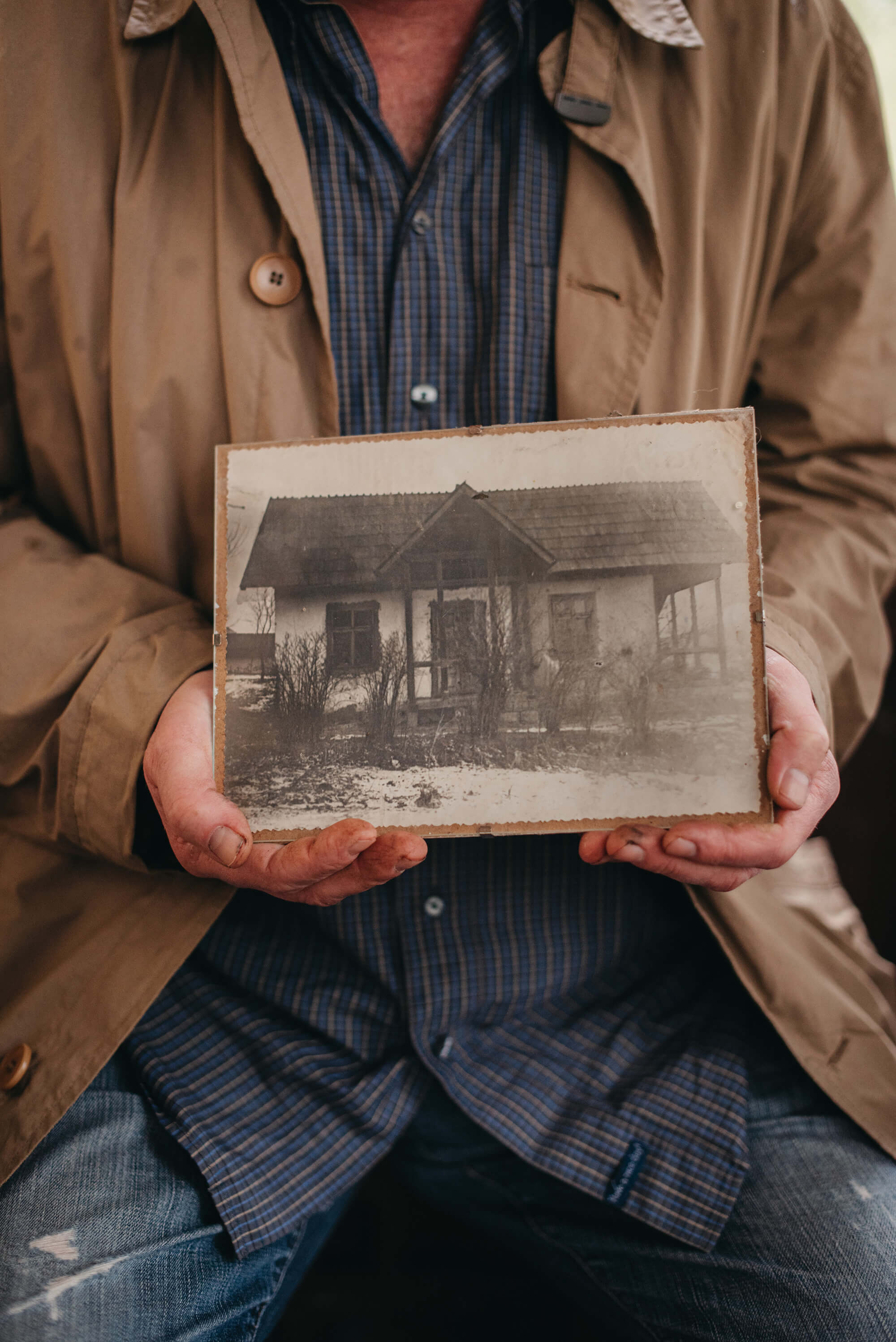
Only those closest to him knew he was assigned to a field intelligence unit. Or that he had very intensive training somewhere in Germany. Or that he had escaped an encirclement near Brody on his own and exchanged all his belongings for the simplest peasant clothes. Or that he was detained by the mobilization department, assigned to a construction battalion, and sent to the coal mines of Kazakhstan.
After the war, he somehow got to his native land and lived underground in the woods near Deliatyn. Some passer-by noticed him during one of his secret home visits and immediately reported to the police. They captured Mykhailo and took him to a prison in Yaremche. And again, amazingly, they charged him only with the fact that he had worked in Germany for several years of his own free will. So Mykhailo Flys found himself in perpetual exile in Chita, where he worked on construction sites, reported to a police station every week, and was under surveillance.
All his letters were censored. He used to write a lot back then, trying to somehow connect with his wife. But after the first letter, his censor did everything he could to make this communication one-way. Karolina kept writing, but there was no reply. So she took advantage of the last opportunity for the Poles to leave and ended up with their daughter in the new lands of Poland.
In 1953, Mykhailo Flys entered into a civil marriage with Sofia, who, together with her ten-year-old son Bohdan, had been evicted from Morshyn to Chita three years before that. In 1956, the exiles were released, and the three returned to Halychyna. At first, they tried to settle down in Morshyn. But nothing came of it because Sofia’s former house had been nationalized and occupied by other people. So Mykhailo took his new family to Deliatyn. Other people were living in his house too, but he knew them. So, although they did not expect the owner to return, they quickly vacated the house.
The house was dilapidated and neglected. So Mykhailo decided to restore it and make it even more comfortable. Mykhailo Flys was 56 back then. Sofia was two years younger.
Thirteen years later, Bohdan brought me to that house for a short stay with his grandmother (Zonya) and grandfather (Mykhas). Due to various circumstances, I stayed there for a long time. And that house, that place, became a benchmark for me. Everything there was simple, elegant, and sensible.
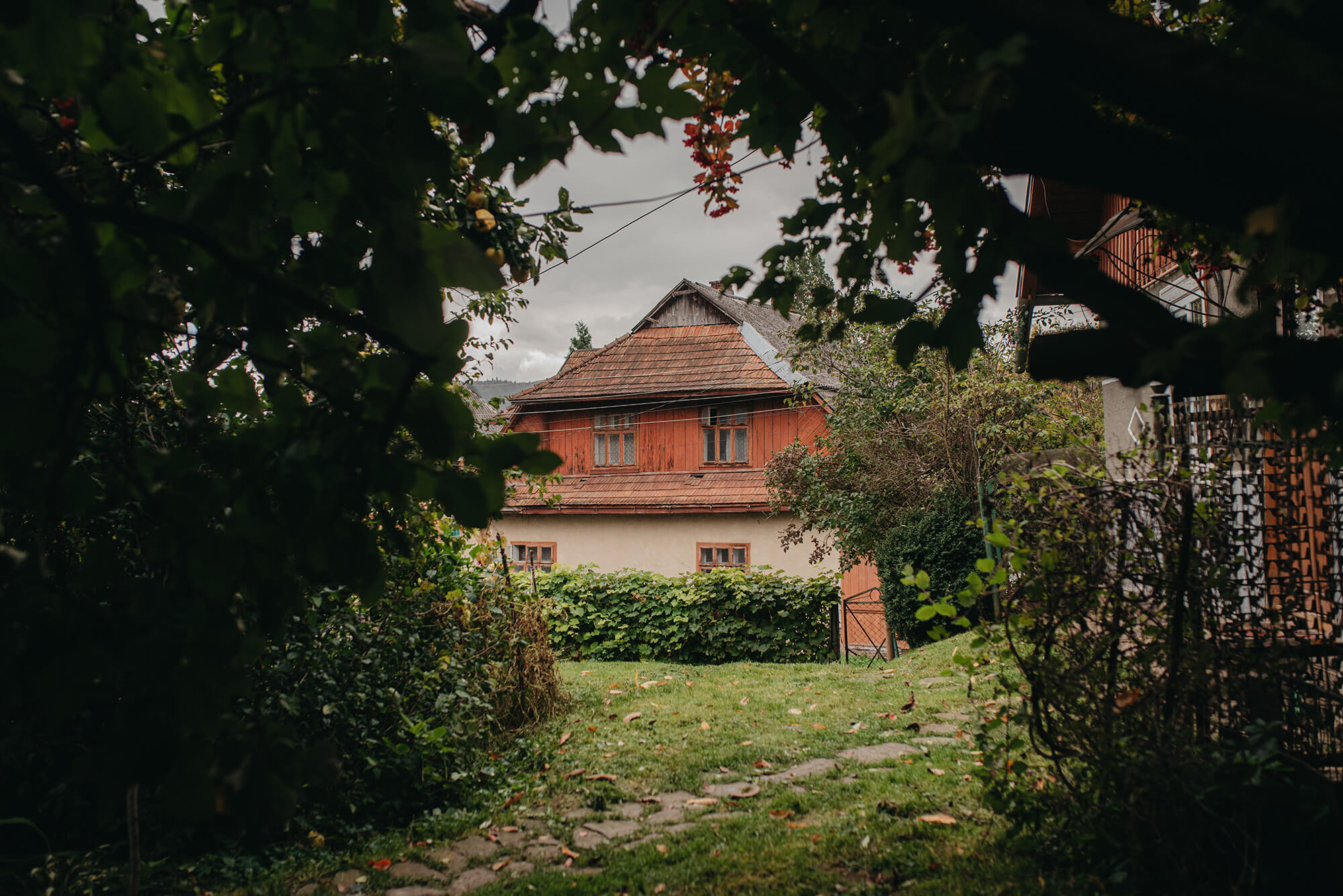
***
The house had two rooms and two entrances. One room, which they actually called the room, could be entered from a small porch. The other room, which also served as a kitchen, had the entrance from the veranda on the opposite side. There was also a high door between the rooms. The grandfather left that room to the grandmother. She brought some things from the family villa in Morshyn, and they gave the simple house by the forest an unusual look. There were two double windows on different sides. In winter, they would put cotton wool between the window panes. One window overlooked the path leading from the street. From that window, one could always see when someone was approaching. There was a wooden bed in the corner. On the wall near the bed was a large carpet with geometric patterns from the 1930s similar to those designed by Kulchytska. Above the carpet was a reproduction of a famous Italian artist with the Holy Family inscribed in a circle. Former grandmother’s boyfriend, Mykhailo Ostroverkha, a journalist and writer who admired Italy, brought it from Rome in the 1930s. There was a long and narrow ancient clock with a pendulum hanging on a hook between the bed and the second window. The darkened brass dial was visible through the glazed door of the clock case. There was a lamp above the bed because the grandmother could not fall asleep without reading. In the other corner was an exquisite old double wardrobe with a mirror in the middle. The mirror was faded in places, and a line on its surface created funny distortions. The wardrobe fitted all the grandmother’s things—all the tablecloths, napkins, and bedding.
A fairly large oval table and four chairs made of bent wood were in the middle of the room. There was also a homemade sofa with an old spring mattress and a bolster pillow on a wooden frame with short legs made by the grandfather. The sofa was covered with a traditional Hutsul woolen blanket. Above the sofa was another carpet—Art Deco with floral motifs. And finally, the most important detail added an accent to the interior—a large pastel portrait of a gorgeous woman with bare shoulders. Once upon a time, an unknown teacher of the Kraków Art Academy left it after his vacation in Morshyn.
In the corner by the door, there was a multilevel bookshelf. Only the most important books were there, among them a large Kobzar, a few volumes of The Ukrainian Calendar (an annual supplement of the Our Word newspaper of Polish Ukrainians), and two volumes of The Red and the Black in Polish. There also were the father’s books from Chita on watch repair and Greco-Roman wrestling. The most venerable book there was the 1936 illustrated cookbook of contemporary Warsaw-Lviv cuisine, and the favorite one was the 1968 album of the best Czech photography.
If it were empty, the main thing that made this room different from the other one was a high, tiled stove made incredibly well by the grandfather, who was well versed in stoves. The wooden floor was not painted but oiled. Two long rugs were on the floor along the bed and the sofa.
The grandfather used to live in the kitchen. He slept and sat on a narrow folding iron bed covered with several blankets. All the furniture there was simple, functional, and painted white. A large table, pushed to one of the windows, was made like a simple bureau desk with three drawers on each side and a footrest in the middle. The drawers closer to the bed belonged to the grandfather. The ones closer to the wardrobe—where, in one section, hung all the grandfather’s clothes, and, in the other one, various foods were stored on shelves—belonged to the grandmother. Each had a drawer reserved for stationery: letters, postcards, photos, and notebooks.
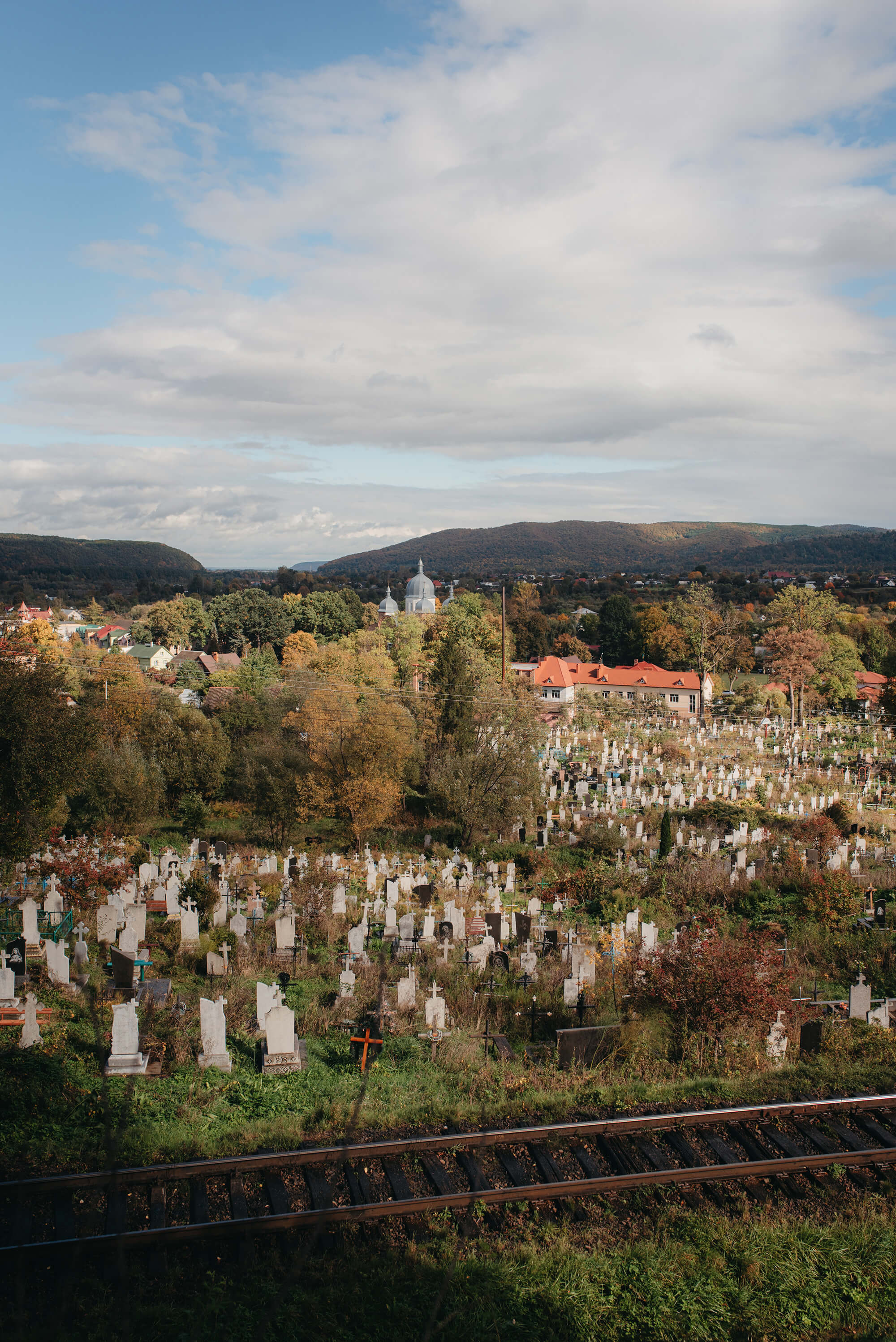
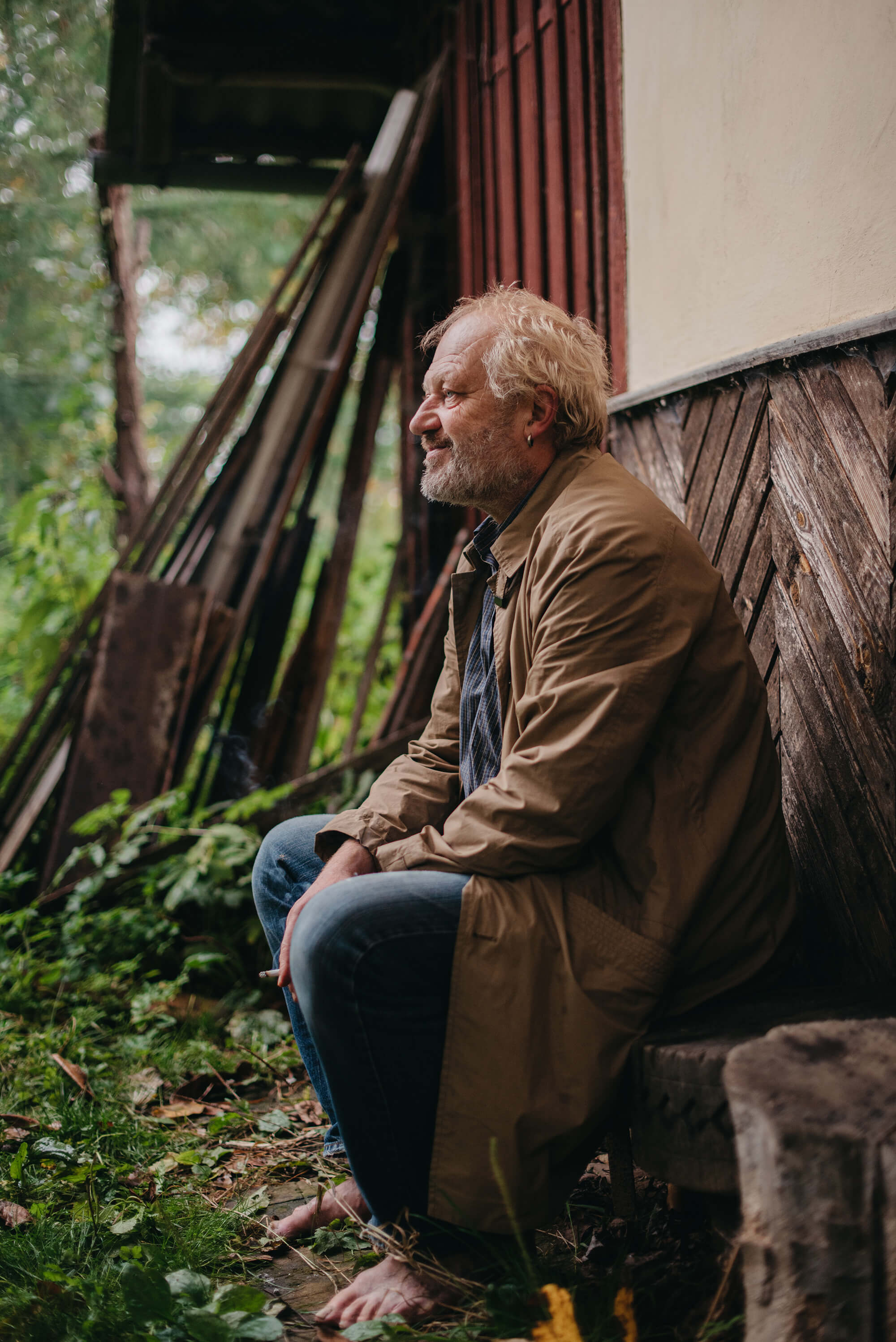
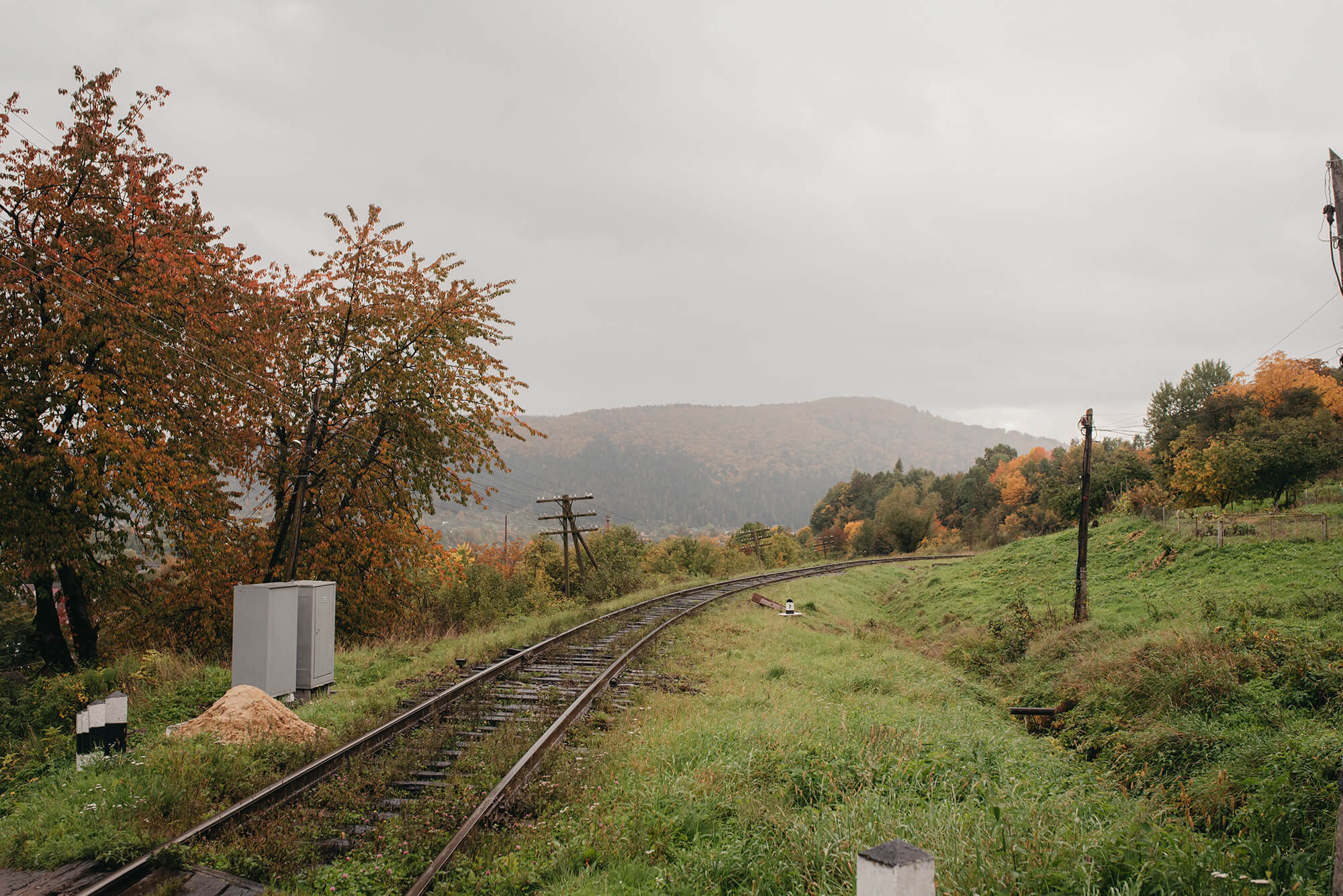
And again, the main thing was the stove. This one was completely different. It was the kitchen, so the stove had a cooking surface with access directly to the fire and an oven for small baking. It also had a built-in cauldron for heating water. There was another door behind which one could bake bread, Easter cakes, and dry fruit. This stove was not designed to retain heat. The cooking surface heated up and cooled down equally quickly, so it was warm in the kitchen only when something was cooking or baking.
There were two buckets of water on a low bench and an aluminum mug nearby for drawing water. There was also a special table with a cutout for a large washbowl. One could wash there pouring water from a cup since the iron-cast water tank above another washbowl was all the way out on the veranda.
Between the kitchen and the veranda, there was also an inner porch with a window to the garden and a pantry with shelves on all the walls. The pantry had a door to the firewood storage one could reach without going outside, and it used to come in handy after nights of heavy snow when it was impossible to open either of the two outer doors.
The house had three cellars. One of them was large and lined with stone. A solid ladder led there, and one could go up and down it like a wooden staircase. The other two were small and secret. Hatches to them were disguised. There was an attic above the entire house. The grandfather laid the walkway around the house with stepping stones that he had cast himself. He hated having the mud by the house.
Besides a small orchard with prune plum trees and some cherries, there were also many ornamental plants. Viburnum and lilac were forming an arch at the entrance to the yard. There were a few jasmines and a Chinese apple tree with pink blossoms. Along the border—the yard was not fenced—there were some currants and forsythia. In addition, the grandmother had an oleander in a large pot. The oleander stood right in front of the porch steps when it was warm outside.
Along the entire back wall of the house, there was neatly chopped firewood stacked in two layers.
In those early years, it was interesting for me to contemplate and memorize the rhythms and cycles people were guided by in their everyday lives. So I contemplated and memorized. And I tried to understand how a house, a home, calmly imposed what to do, how to move, what to say—and when.
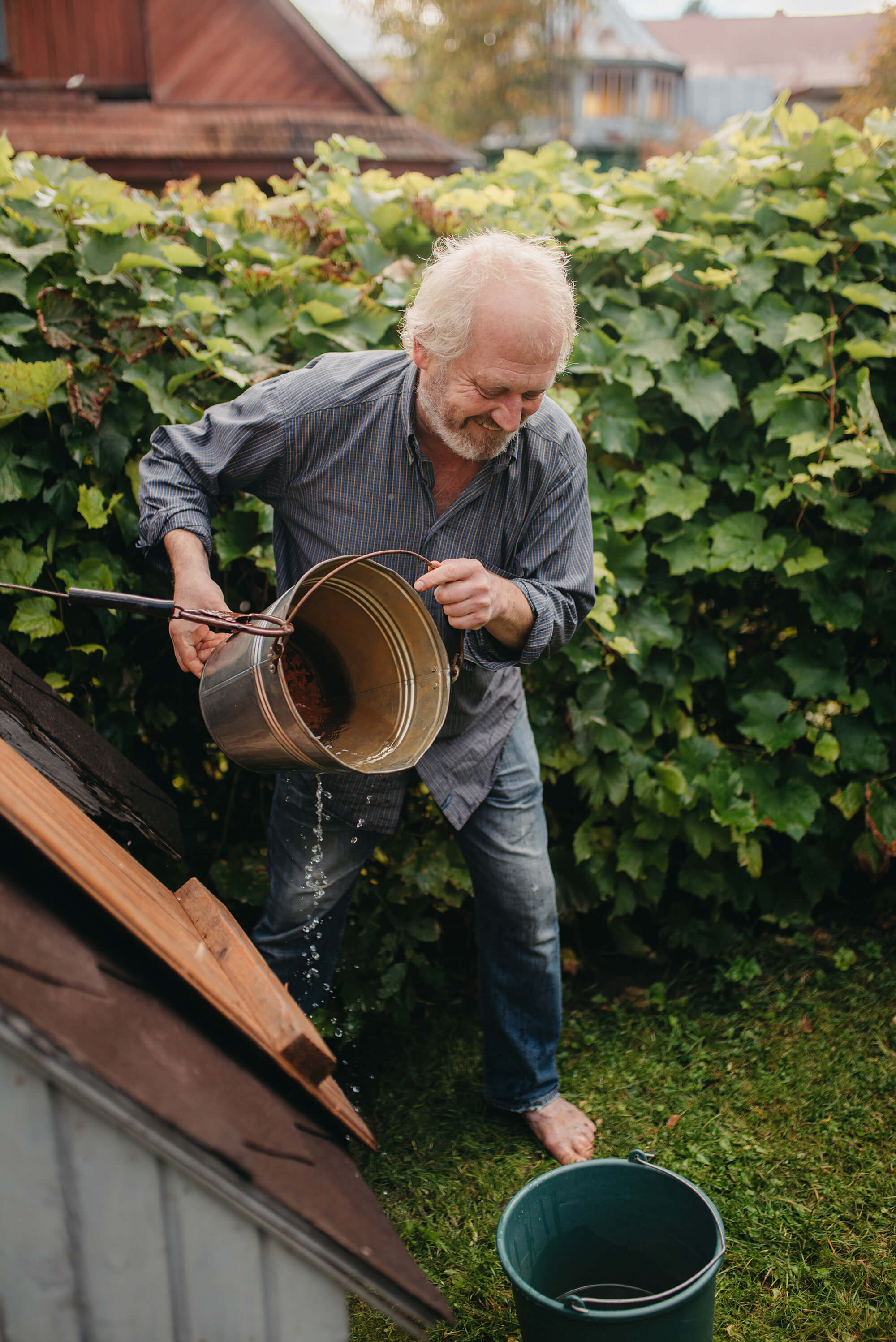
On winter evenings, the grandmother would visit the neighbors who had also returned from Siberia but ended up in Deliatin by accident. They were granted several rooms in a nationalized sanatorium villa with a colored tiled roof that we could see from the window. They would play bridge there and talk about all kinds of topics from the past. The grandfather would stay with me in the house. We would sit in semi-darkness by the stove’s open door and heat it well to keep us warm until the morning. The grandfather crafted some prison cards, and we would pretend to be playing and talk about something very distant. Then the grandfather would take out his diary—a rough notebook with a leatherette cover—and take note of what had happened that day, and I would add a thing or two from my memories. He started keeping his diary back in 1956. Later, the grandmother would return, letting in the magical smell of dark frost. We would warm her featherbed, leaning it against the stove, and then I would help the grandfather make his bed. He would kiss the grandmother’s hand to thank her for the day and return to his cold. I would fall asleep watching the grandmother read her book. In the morning, the grandfather would wake us up with the sounds of the stove being lit. With my eyes closed, I would listen to every sound, trying to recognize what was making it—the door, a beech log, a spruce chip, a lit match, the crackling fire.
***
Mykhailo Flys died in September 1983. Back then, I was fifteen years old. The grandmother moved to Frankivsk for the winter. The whole next summer I stayed with her in Deliatyn. It was unusual for her not to be at home. And it was unusual to be at home alone.
They lived together for thirty years, although they met when they were both in their fifties. That summer, the grandmother told me that those thirty years were the best time of her life.
By the way, she said the same thing ten years later.
Looking at the numerous photos depicting random and lightning-fast seconds of their long life, I willingly believe her.
Have read to the end! What's next?
Next is a small request.
Building media in Ukraine is not an easy task. It requires special experience, knowledge and special resources. Literary reportage is also one of the most expensive genres of journalism. That's why we need your support.
We have no investors or "friendly politicians" - we’ve always been independent. The only dependence we would like to have is dependence on educated and caring readers. We invite you to support us on Patreon, so we could create more valuable things with your help.
Reports130
More






